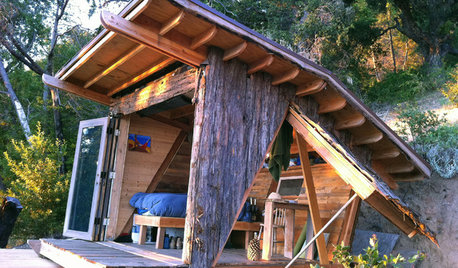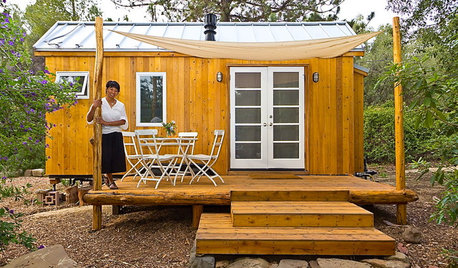Living off hydroponics???
I'm new to this, and just curious about the possibilities, regardless of cost.
All questions related to hydroponics only.
1. Is it possible to grow a wide enough variety of foods hydroponically to meet all of your body's food needs?
2. If so, how much room would be required to grow enough food to sustain one average sized person?
3. Is there a list somewhere detailing all of the possible foods you can grow hydroponically?
4. Is it feasible NOT to use pesticides or herbicides on hydroponic foods if grown in a sealed environment?
5. Has anyone you know of or heard of lived off of only hydroponic food for a long time, or almost completely on hydroponic food? How was their health in relation to the general public?
6. What would be the price range for such an endeavor, to live off of purely hydroponic output?
7. What are the best books on learning about hydroponics in your experience?
Thank you so much for your answers!
Comments (17)
adaptusaaf
Original Author14 years agoThank you for replying grizzman!
1. I meant that is it possible to grow a wide enough range of foods with hydroponics every year in a relatively short time (without waiting 20 years for a walnut tree to grow for example).. Are the short term yielding plants (fruits,veggies, and their nuts) able to give you a healthy diet?
2. I'm just asking for a ballpark figure, I have no idea if I'd need a warehouse-size area or a shed-size area.
3. I'm a real newbie at definitions, are nuts considered fruit and fruit considered plants, so you can grow nuts hydroponically too?
4. That's great! Pesticide reduction was the main reason I want to live off hydroponics!
5. I asked if people can live off hydroponic yields because something inside me says that hydroponic plants might be missing something that other plants get from the tiny tiny unknown things in the soil we don't know about yet? I'm a newbie though so I could just be paranoid.
6. Yes I wanted to know if it's possible to live off hydroponics regardless of cost, and then wondered what that cost would be lol I'm spacey.. Considering you bought everything that automates the process as much as possible so as little time as possible upkeeping the system is spent, what would be the cost of such a system for one average person?
7. What books do you have? What website resources are the most valuable to you?
Thanks grizzman and please everyone else answer these questions too I need opinions!
Related Professionals
Ballwin Landscape Architects & Landscape Designers · Kyle Landscape Architects & Landscape Designers · Centereach Landscape Contractors · Essex Landscape Contractors · La Vista Landscape Contractors · Lady Lake Landscape Contractors · Lees Summit Landscape Contractors · Longmont Landscape Contractors · Longview Landscape Contractors · Lynchburg Landscape Contractors · Mason Landscape Contractors · Rio Linda Landscape Contractors · Vancouver Landscape Contractors · West Covina Landscape Contractors · Wilsonville Landscape Contractorslucas_formulas
14 years agoHi adaptusaaf,
Firstly I'd like to know about your motivation: are you interested in practically realizing a self sufficiency project mainly based on hydroponic culture, or are you only inquiring out of curiosity, - or are you doing some kind of exposé or home work?
You are asking some crucial questions here, that actually need extensive research and investigation. Much will anyway depend on conditions as climate, concept and choices of the whole venture. If you want to achieve self-sufficiency, you should by all means look at the bigger picture and perhaps not limit on hydroponic culture. (trees bushes, poultry (eggs), fish pond, etc)
Wondering about the needs of (and the costs for) a single person in this context is perhaps not the right approach and question in the first place. As a sustainable self-sufficiency project is much more likely to be undertaken by a family or small group (rentability and practicability). In this family or group their may be children or people who will- or cannot work -but need to be fed though.
With a purely vegetarian diet the most important concern is your protein supply. Typically nuts, all kinds of protein rich crops and leguminous plants are required in decent quantities. But there are many interesting (although not very popular) alternatives, as amaranthus, moringa oliefera and other, actually underestimated and/or rated 'edible' plants. Species that are extremely rich in proteines and trace elements. Some of them are quite easily grown in hydroponics and well suited for self-sufficiency projects. This is actually a field of my own interest and concern....
Btw: the very basics of our society and cultural development were, and still are based on 'industrialized' agro-culture with the means of huge crop production. Without a surplus of 'crop-proteins' you sooner or later tend to fall back to a post hunter-gatherer society LOL. Well indeed, in the context of self-sufficiency, we sometimes tend to forget where we came from, how we became what we are and last but not least: how and why we are able to stay what we are!
PS. Have you heard about Aquaponics? I guess this speciality should be of interest to you http://www.youtube.com/watch?v=wS3sej53gx0 (also watch the other related videos!)
Here is a link that might be useful: Aquaponics ---->
adaptusaaf
Original Author14 years agoThank you for replying lucas formulas!
1. My motivational goals are life extension and highest grade of nutritional health achievable. Self sufficiency was also a motivation but not the main factor. The reason I want to be able to grow everything myself is so I can know the quality of the product for sure, without having to buy it from someone else. It is not homework or scientific research but personal endeavor! :)
2. Hmm, well assuming you had controlled climate, indoors for example, and your goal was to feed yourself the most nutritionally stable diet available to be grown. I will definitely be researching it further on my own, I was just hoping to get an 'idea' if it's possible first!
3. So it is possible to get decent protein from hydroponics if you plan carefully. Great!
4. Yes I have heard about aquaponics as well as aeroponics, both interest me greatly, aeroponics more so than aquaponics. If I had to rely on fish as well though, it wouldn't be too bad. Is it possible to do without going up the food chain though? Aeroponics seems even more controlled than hydroponics, but the lack of people doing it made me use hydroponics as the main subject of inquiry.
Thanks lucas formulas!
jessicavanderhoff
14 years agoI think what others are saying is, sure, fundamentally, it's possible. You can live on beans, etc, and they produce relatively quickly. Whether you'd want to is another story. Most vegetarians I know are anemic, and I feel better if I eat lots of protein- more than in beans and nuts- so, not really my thing either. Stuff like wheat takes up a lot of space- like a 10 by 2 foot plot of wheat takes an entire season to produce enough for a loaf of bread. Even with space-saving systems, it's probably grossly impractical. Are you prepared to never eat bread, tropical fruit, milk, etc again so that you can say you grew all your own food? If you've never tried hydroponics or grown a garden, it's probably not practical that you'd be substantially feeding yourself anytime soon without serious professional help.
wordwiz
14 years agoI would also advise considering the costs, especially if you live in a cool climate. If you have a greenhouse, it will cost quite a bit to heat it in winter. If you are doing it indoors, there is the cost of lighting, especially if you plan on growing enough to feed yourself.
But on the other hand, I have a 900 sq. ft. garden and I can grow enough tomatoes, potatoes, green beans, carrots, cucumbers and onions to feed my family for close to a year (with the exception of the onions - they only last for a few months). But I buy my peas and corn, breads, and such because it would take up far too much room.
Mike
lucas_formulas
14 years agoI guess that the given parameter "regardless of cost" was understood by adaptusaaf as purely theoretical. Simply to know IF all of it was actually possible - despite costs.
@ adaptusaaf >>1. My motivational goals are life extension and highest grade of nutritional health achievable. Self sufficiency was also a motivation but not the main factor.That's understandable and kinda pragmatic thinking. But in my mind there is some ambiguity though, if not going ahead with complete self-sufficiency. Because if you only partially have the highest grade of nutritional quality, what about the other part (you need to buy or provide from other sources)? Because if you are not self-sufficient, you need to provide an important percentage of your food from other sources and certainly some without knowing exactly how "high" the grade actually is? Tropical fruits were mentioned earlier: how would you know about there actual grade? And how would you call your mixed diet at the end..., actually what odd compromise would it actually be at the end?
>>3. So it is possible to get decent protein from hydroponics if you plan carefully. Great!I guess it is but still no easy task, though. And I bet you have to really consider and investigate about some of the "alternative" crops I mentioned earlier, as well as using top technology, (not necessarily high tech as aeroponics).
>>Aeroponics seems even more controlled than hydroponics, but the lack of people doing it made me use hydroponics as the main subject of inquiry.Going for "real" aeropononics isn't actually a bad choice depending on goals. The main inconveniences are high energy consumption (compared to other systems) and it's susceptibility (clogging etc). Power failure may be fatal as well. The main reason why I personally do not use it. Aeroponics are mainly used for research and highly valuable plants like medecinal plants, propagation of rare seeds (creating clones) or similar applications.
PS: I don't know about anyones vegetarian acquaintances, but I truly hope that the previous message (no offense intended anyway) wasn't meant to imply that most vegetarians are actually anemic. Despite the fact, that most of the world's vegetarians are vegetarians BECAUSE of their economic situation (general, local or personal), most of them are NOT anemic because they are vegetarians. Imbalanced and wrong nutrition (a lack of iron and Vitamins) is the actual cause. A balanced veggie diet can truly supply enough iron and vitamins to avoid any nutritional deficiency. Aneamia is one of the most widespread deficiencies in humans today - worldwide. Its not at all the preserve of vegetarians!
Assuming that being vegetarian equals being anemic, would simply be falling for a false cause. "She got very sick after she visited Afghanistan, so something in Afghanistan caused her sickness." Or could it also be that she was already sick prior to leaving for Afghanistan? ;-)
jessicavanderhoff
14 years agoI am suggesting that the cause of the anemia in the vegetarians I know is their vegetarianism (these are not people who can't get enough to eat, these are middle/upper class Americans). No doubt that it's possible to be a non-anemic vegetarian, but it must be hard, because in practice it seems to be rare. And this isn't some sort of us-versus-them situation-- I was vegetarian for years.
"She got very sick after she visited Afghanistan, so something in Afghanistan caused her sickness." Or could it also be that she was already sick prior to leaving for Afghanistan? ;-)"
Are you suggesting that vegetarians have some sort of pervasive preexisting mental or physical disorder? :-P
lucas_formulas
14 years agoBeing anemic vs. non anemic is only a question of an adequate daily diet that avoids any sort of deficiency. If some or more vegetarians are not aware of this fact, or don't know how to provide a healthy and equilibrated diet, it simply means that they are rather ignorant. The same thing happens to most "non-vegetarians" of the western world, - but actually the other way round: they have to high collesterol levels, suffer under obesity, high blood pressure, strokes, kidney failure, and many other health problems.
PS: In some cases, some kind of eating disorder is driving people to become vegetarians. In this case they obviously have had another DISORDER in the first place. ANY conscious, and to some extend informed vegetarian can avoid anemia in the most simplest ways. Actually in the same ways as omnivores can avoid an inadequate and to rich nutrition. By conscience, knowledge and control!
>>And this isn't some sort of us-versus-them situation-- I was vegetarian for years.Sound like a classical 'Statement of Conversion' argument to me: the speaker says "I used to be X". The speaker is herewith implying that he/she has learned about the subject, and now that he/she is better informed, he/she has rejected X. So perhaps he/she is now an authority...?
Since I am not interested in rhetorical argumentation: In this context and according to the question catalogue of this topic, my statement remains the same. It is possible to hydroponically grow vegetables and crops to provide a healthy and equilibrated, so to speak complete nutrition. But of course this will require good knowledge of nutritional science and facts and the right choice of well suited vegetables and crops as well. It is probably not suited for people who are rather used to-, or even spoiled with all kinds of- industrially processed, imported or exotic -foods, sweets, huge meat consumption and animal fats, etc., etc...
Anyway, if omeone will go down this road it would indeed be a very personal choice. Hence it shouldn't be doubted by other opinions, - and even less through rhetorical fallacies, stereotypes or clichés.
jessicavanderhoff
14 years agoIt seems like we're having several different arguments here, but in the interest of debate:
"Being anemic vs. non anemic is only a question of an adequate daily diet that avoids any sort of deficiency." Well, yes, obviously. But this is not very interesting, to me. What's interesting to me is what happens in practice (article below)-- not in theory, where all vegetarians eat 14 pounds of raw organic spinach each day.
I haven't claimed to be any sort of expert. I talked about people I know and my choices. I offered my perspective, which a reader might or might not take into account when making his or her own decisions.
Yes, it is a fair argument that meat eating comes with its own set of nutritional challenges. Because I am prone to protein deficiency much more than high BP, high cholesterol, diabetes, etc, I prefer eating meat. Other people may have different concerns, which is why I talked about my experience and didn't tell other people what's right for them.
In the interest of preserving of my ego/ gardenweb reputation , I think most people who know me would not identify me with industrially processed food. I grow many of my own veggies using organic compost that's either from a local farm or made from my vegetable scraps and untreated sawdust. During the growing season, about 90% of the produce I eat is local-- either grown by me or bought from the farmer's market. (I buy lemons and limes, the occasional banana, and so forth, from the supermarket). I buy local dairy and meat sometimes, although can't always afford it. I buy eggs and honey from a local chicken farmer who takes extremely good care of her chickens. I even buy locally roasted coffee. I believe in supporting the local economy and minimizing transport pollution. I also make just about everything from scratch. I make my own noodles. When I make pumpkin muffins, I start with a pumpkin. I can my own tomato sauce. I do not live on ho-hos and hot dogs. Even for someone like me, who's a garden enthusiast and has no children to support, feeding myself completely would be difficult. Possible, as I said, but difficult. On this subject, I thought Animal, Vegetable, Miracle was enlightening. Their family ate locally for a year-- not even homegrown only, just locally-- and it was very difficult; a huge lifestyle sacrifice. For me, the right choice is eating locally a lot of the time, but not being fanatical about it. If you're feeding yourself completely with what you grow (which would be surprising-- I've never met or even heard of anyone who is), then more power to you.
In the interest of sportsmanlike conduct, I will refrain from commenting on your spelling or grammar. If English is your second language, I refrain on the grounds that you are doing staggeringly well for communicating in your second language....
lucas_formulas
14 years agoJust a few (hopefully) clearing sentences:
1. I've just tried to give my objective statement to this interesting topic - with which I am personally concerned of, by the way,- and have sustained it eventually by some (hopefully plausible) arguments. Nothing more nothing less.
2. I (still) do not agree with any generalization that claims (implicitly or explicitly) that most vegetarians are anemic. Btw: I am not a vegetarian and I am not defending any cause here. But I am strictly positive about the possibility of being able to hydroponically growing vegetables and crops that provide a nutrition which doesn't lead to- or cause any physiological deficiencies in humans, including Anemia. Theoretically as well as practically.
3. When I was referring to a general tendency of omnivores that are oftenly having bad nutritional habits (and the whole Enchilada that goes with it) - or even suspecting them being ignorant about the topic, it was solely meant as an analogy to what was SAID earlier about vegetarians. I didn't refer to anyone in particular, nor was it meant personally (at no time). Hence I didn't expect any personal reaction, explanation, justification nor an extensive appeal to sympathy - in response. No need for any of it, - truly!
4. I have been trying to answering technically and objectively until "then". I am seriously in doubt if single personal observations (especially if clearly emotionally conditioned) are of good use or do contribute objectively to the topic anyway. This part has strictly nothing to do with being an expert or not, anyone should avoid it for the sake of it.
5. English is not my secondary language, it's actually my fourth. I am not a frenchy either, but I am fluent in french, though! I've been always thinking and also being taught, that even mentioning grammatical or orthographical mistakes of others was kind of a tabu in any forum. Regardless of origin or writing skills. Understandable, as some pretend it is one of the most unfair (and actually pretty weak) arguments there are.
6. Good knowledge, actual facts, a verbally "helping hand", as well as plausible arguments should firstly be seen and treated as what they actually are, before related to the identity of any speaker or "messenger". Simply because they always are and remain what they are! Wether false or true, plausible and helpful - or completely busted and worthless. And that principle should generously (but strictly) be applied to anyone and with anything that is said. Oh, I barely forgot to mention: by anyone who can actually cope with the facts and the truth ;-)
Have a nice day (or night) folks!
dennyg
14 years agoI'm a little late with my input, BUT one thing that hasn't been mentioned is amount of labor and attention required to grow vegetables, hydroponically or otherwise. Automation will decrease the labor somewhat; but planting, pruning, training and picking the fruit are still very manual labor intensive. Then there is the issue of maintaining the system. Pumps, valves, motors, sensors, controllers all, in time, will malfunction. If one doesn't detect and fix the problem promptly, the plants will die or at least be damaged so badly, that they stop producing. And last but not least, are the bugs and the diseases. Forget about extended vacations.
Hydro-Ash
11 years agoResponding very late - 3 yrs late :-).
Last month is when I got into hydroponics. Motivation was simple - should there be a supply chain disruption of food supply for whatever reason, I should be able to have some basic sustenance which is fresh. SO my thought process is to stock up nuts, grains (rice+flour), lentils, soups etc. that can be stocked up and use the hydroponics to grow some fresh vegetables and greens. I also plan to stock on seeds.
To this extent, I have got a basic 18 pot (3") ebb and flow system. Lighting is the main operating expense and for 18 pots I am running about $7-10 in electricity bill (254 W T5HO). I have yet to see the yield but if successful then I will expand it to additional 50 pots in the hope that it will sustain us for basic needs.
So far I am growing Tomato, beans, lettuce, fenugreek, and ruby chard. Haven't had much luck with Spinach and green peppers (though I think that my seeds might have been damaged due to poor storage condition).
Hope this helps.
P.S> By the way I am pure vegetarian and am pretty healthy and strong. Nuts, corn, beans and lentils give me all the protein I need.
georgeiii
11 years agoMay I sugest my method of Sustainable Hydroponics. You can grow your own nut, fruits, coffee,bio-fuel and vegatables in a way that does no harm to the earth. Plenty of picture and it's done as a simple Arts and Craft with recycles plastic containers. Just go to Photobucket/ ChristianWarlock. Of couse as lucas mentioned after awhile you'll start needing help.
{{gwi:48599}}
Kenneth Whaley
8 years agoI hate to chime in slightly off topic, but I happen to be a middle class American Vegan, (meaning i consume zero animal byproducts); so I thought that I may have some input on the topic of nutrient levels in a strictly plant based diet.
I am not anemic, I have no protein deficiencies, nor any other nutrient deficiencies. To help unravel the confusion, animals happen to get the nutrients that they contain, by eating plants! So if you think about it, they are only filtering out the majority of these amazing vitamins and minerals.
Protein is the funniest topic as well, no one seems to realize that, per ounce, broccoli has twice as much protein as steak. Minerals, (such as iron) come from soil.. where plants grow. Omega 3's (that everyone thinks only fish have).. comes from the algae they eat.. that you can buy in whole foods markets! Calcium, collard greens, and B 12 nutritional yeast. Magnesium? Squash seeds and dark greens! For anyone that wants to talk "good cholesterol", the body naturally produces its own. That covers every nutritional argument I think. Any further inquiry, use google or youtube.
Thank You
Povel Vieregg
7 years agoOk late comment but I haven't seen any specifics in the comments so I offer some of my details when looking at this. I don't actually do any of this, but have had an interest in this because I am trying to write a novel about surviving on Venus using hydroponics :-D So figuring out the details of how much space, sun, fertilizer etc is need is of course very important.
I'll detail my method if that helps you. I use the DIY Soylent page which is basically a place for people to compose healthy meal replacements you can eat every day without getting deficiencies. So you can select a nutritional profile e.g. one recommended by American health authorities, which states how much you need of everything: vitamins, fats, minerals etc. Then you can add ingredients, specify quantity and it will update showing how much of the target needs you are covering. So I play a bit around with this and found that 1600 grams of beans would give me about 2100 kcal and cover about 80% of my protein needs. But only 10% of my fat needs would be covered.Now what is required for growing 1600 grams worth of edible beans each day? I found this page which details how many grams of edible vegetables and fruits can be grown per square meter per day, in a hydroponic system. It states e.g. that you can grow 93 grams of beans (like e.g. black beans) per day per square meter. Interestingly you can grow massive amounts of bean sprouts each day, like 500 grams almost. So to get 1600 grams of beans each day you need roughly 20 square meters. That was my calculation but I've seen an online article where a guy claims they can grow enough food for a space colony within 8 square meters for a hydroponic system. I am not sure if they are using more efficient types of food then or simply stacking vegetables. If you grew potatoes the figure would be similar. Although potatoes give less kcal per 100 grams, you can grow slightly more grams of edible potato per square meter.
But that gives you a ballpark figure. My problem is figuring out how to deal with fat, as the page detailing how much you can grow doesn't mention fatty things like nuts.
For my novel, I am speculating that perhaps an algae biorector is the way to get fats. Soylent gets their Omega-3 e.g. from algaes from bioreactors. Unfortunately I have not found any numbers for how much space is needed for growing a certain number of grams of omega-3 from algae per day.
















grizzman